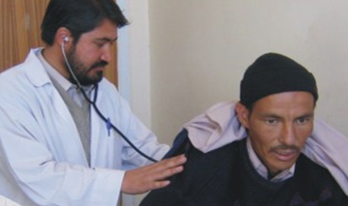Kabul, 4 July 2018
 Doctor listening to a tuberculosis patient’s lungsWith the support of the Government of Japan, World Health Organization Afghanistan has contributed to the significant strengthening of Afghanistan’s capacity to detect and treat tuberculosis (TB), a potentially serious communicable disease, which continues to be a major public health threat in the country. As many as 65,000 cases and 12,000 deaths were estimated to be caused by TB in Afghanistan in 2016.
Doctor listening to a tuberculosis patient’s lungsWith the support of the Government of Japan, World Health Organization Afghanistan has contributed to the significant strengthening of Afghanistan’s capacity to detect and treat tuberculosis (TB), a potentially serious communicable disease, which continues to be a major public health threat in the country. As many as 65,000 cases and 12,000 deaths were estimated to be caused by TB in Afghanistan in 2016.
During a four-year, 10 million dollar project WHO supported procuring anti-tuberculosis medicine and laboratory consumables, which facilitated the examination of over 1 million presumptive TB cases. The project also contributed to the expansion of laboratory network and procured medicine for more than 160,000 drug susceptible TB patients and 600 drug resistant TB cases.
In addition, a TB drugs and logistics management manual, training curriculum and other training materials were developed. These materials were used to provide training for 960 health staff on TB drugs and logistics management.
The WHO project also established medicine storage facilities for Central Drug Stores, National TB programme and Afghan-Japan communicable disease hospital in Kabul and renovated 13 provincial drug stores. During the project, WHO delivered anti-TB medicines and laboratory consumable kits to all the provinces to prevent drug stock-outs.
 New tuberculosis Drug store in the Afghan-Japan Communicable disease hospital in Kabul Further technical assistance provided by WHO included monitoring of activities, revision an development of several key guidelines and standard operating procedures (SOPs), inclusion of new drugs to manage drug resistant TB in the National Essential Drug List, revision of national strategic plan 2017–2021 and action plan 2017–2018, establishment of Drug resistant TB treatment review panel to provide technical guidance and other measures enhancing the national capacity.
New tuberculosis Drug store in the Afghan-Japan Communicable disease hospital in Kabul Further technical assistance provided by WHO included monitoring of activities, revision an development of several key guidelines and standard operating procedures (SOPs), inclusion of new drugs to manage drug resistant TB in the National Essential Drug List, revision of national strategic plan 2017–2021 and action plan 2017–2018, establishment of Drug resistant TB treatment review panel to provide technical guidance and other measures enhancing the national capacity.
The results are impressive. The detection of tuberculosis cases increased dramatically: Overall there was an a 44.9% increase in case notifications, and case detection rate increased from 53% in 2014 to 70.5% in 2017. Treatment success rate was increased from 87% to 89.2% between 2014 and 2016. In addition, there was a 126% increase in the detection of drug resistant TB cases and subsequent enrollment for treatment.
Dr Richard Peeprerkorn, WHO representative in Afghanistan, commented on the successful completion of the project, stating that “Tuberculosis still remains a significant public health problem in Afghanistan. Uninterrupted supply of good quality medicine and laboratory commodities are fundamental to the successful detection and treatment of tuberculosis. Shortages of drugs and laboratory supplies may result in delays in diagnosis, initiation of treatment, or in the interruption of treatment”.
 Representatives of WHO Afghanistan and Japanese government signed a new grant for 2017–2020 in KabulThe project ran from November 2014 to May 2018. As a result of the successful implementation, WHO and government of Japan signed a follow-up grant to continue the work in 2017–2020.
Representatives of WHO Afghanistan and Japanese government signed a new grant for 2017–2020 in KabulThe project ran from November 2014 to May 2018. As a result of the successful implementation, WHO and government of Japan signed a follow-up grant to continue the work in 2017–2020.
Dr Peeperkorn thanked the Japanese government for their generous support: "WHO Afghanistan is very grateful to the government of Japan for supporting this important project. Thanks to the new grant, we are able to continue the key activities of the project. We look forward to continuing our fruitful cooperation further to advance the health and wellbeig of Afghans".
WHO Afghanistan’s work with Tuberculosis
For more information, contact:
Dr Supriya Warusavithana
This e-mail address is being protected from spambots. You need JavaScript enabled to view it



